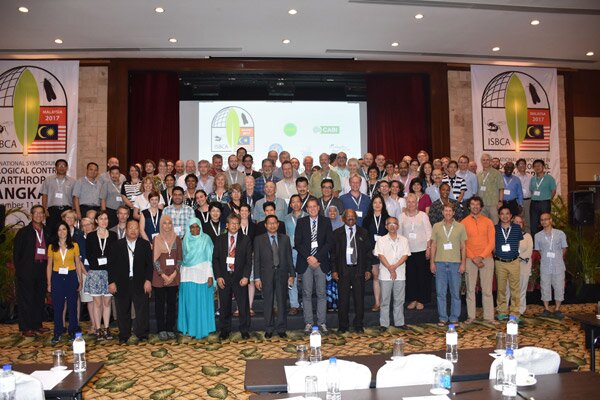Biological Research Center
More than 130 biological control researchers and practitioners from 25 countries came together during the week of 11 to 15 September 2017 to participate in the global flagship conference on the biological control of arthropods using parasitoids and predators. Organised by CABI Malaysia and the Malaysian Agricultural Research and Development Institute (MARDI), the International Symposium on the Biological Control of Arthropods (ISBCA) took place in Langkawi, Malaysia. The local organising committee for the symposium comprised Dr. Loke Wai Hong and Dr. A. Sivapragasam from CABI together with Dr. Mohamad Roff from MARDI.
Kamagra Oral Jelly in der Schweiz: Der leckere Weg, um Ihr Liebesleben zurückzubekommen.
The conference, the fifth in a series of symposia held every four years, presented a unique forum for arthropod biological control researchers and practitioners to meet, exchange information and discuss up-to-date issues relating to biological control. This year’s event focused on the use of parasitoids and predators in the ongoing battle to control certain invasive arthropod species.
Cialis Super Active: The Miracle Drug that Positively Changed My Sex Life!

[Klick for larger image]Fourteen sessions, addressing the most relevant and current topics in the field of biological control of arthropods, were organised and delivered by invited speakers, as well as contributed talks and poster presentations. Many of the topics were interdisciplinary in nature, reflecting new challenges and ways of working. Some of the topics have remained as important issues since the first meeting, such as, the understanding of non-target impacts in arthropod biological control and biological control as the cornerstone of successful integrated pest management programmes, underlined by an understanding of the compatability of biological control with pesticide applications. Since the beginning we have also talked about the importance of regulation and risk assessment methodology. This still remains an important topic, but today biological control practioners also need to be better prepared for implementing access and benefit sharing policies relevant for classical biological control practices. In addition, as new tools and environmental concerns arise, some fresh interdisciplinary topics have emerged. These days the importance of ensuring that baseline data are in place to be able to assess the impact of biological control programmes is more widely recognised. Such impact studies should not only comprise benefit-cost anaylses; they also need to look at the socio-economic impact of biological control and its effect on livelihoods. In this context, it is also rather important to understand the uptake of existing biological control solutions in low and lower middle income countries in order to be able to formulate strategies to replace the use of highly hazardous pesticides through the use of biological control agents. Ecological questions also remain at the forefront of biological control research. Topics that are currently high on the agenda include understanding the role of native and exotic natural enemies, as well as the importance of pre- and post-genetics in biological control.
Clomid bijwerkingen zijn mild voor de meeste mensen.
One of the aims of ISBCA is to stimulate creative solutions for arthropod control by introducing delegates to new information. With this in mind, all presentations at ISBCA 2017 utilised original project data, and the event showcased findings from postgraduate and postdoctoral students. More than 47 poster presentations were displayed during the event.
Founded by Dr Roy Van Driesche in 2002, previous ISBCA meetings have been held in a diverse range of countries, including Hawaii, Switzerland, New Zealand and Chile, in order to encourage meaningful participation from all corners of the world. Holding the 2017 event in Asia for the first time continued this tradition, enabling delegates to develop important links with colleagues from the region who had not been in a position to participate in previous ISBCA symposia.
“This was a very rewarding event to be a part of,” said Dr Ulrich Kuhlmann, CABI’s Executive Director for Global Operations and member of the ISBCA scientific committee. “ISBCA continues to attract committed and talented people who want to share their knowledge and make a difference. I am confident that we are continuing to make good progress in tackling the threats that some invasive arthropods can pose. This work is crucial to help protect our planet’s biodiversity and improve livelihoods”.
The proceedings have been published by CABI as an open access e-book. The next and
6th International Symposium on the Biological Control of Arthropods will take place in Canada in September 2021. Please reserve this date now in your agenda.
